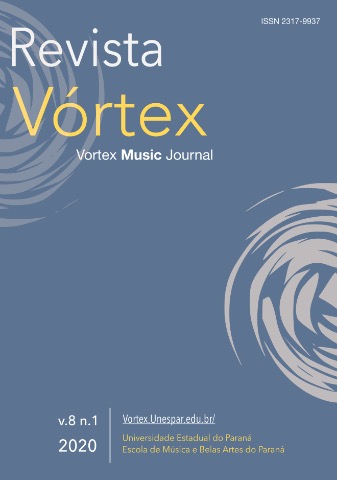Sound Narrative: Honing a Deeper Understanding of Soundscapes
DOI:
https://doi.org/10.33871/23179937.2020.8.1.16Palavras-chave:
Soundscape, Field Recording, Critical Listening, Narrative, CompositionResumo
This essay reports on the pedagogical and curricular decisions guiding the creative activities in the author's university course incorporating field recording, soundscape-based composition, and digital technology. In keeping with the issue's theme of 21st-century composition, the article includes critical reflection and a consideration of the influence of R. Murray Schafer. It contextualizes the course in the broader context of modern compositional activities in university settings. The author's creative practice informs much of the pedagogical framework as a soundscape-based composer.
Downloads
Referências
BENNETT, D., MACARTHUR, S., HOPE, C., GOH, T., and HENNEKAM, S. Creating a Career as a Woman Composer: Implications for Music in Higher Education. British Journal of Music Education, 35:3, pp. 237-253, 2018.
BOLD, C. Using Narrative Research. Los Angeles, CA: Sage, 2012.
DANA, N. and YENDOL-HOPPEY, D. The Reflective Educator"™s Guide to Classroom Research: Learning to Teach and Teaching to Learn Through Practitioner Inquiry. Thousand Oaks, CA: Corwin Press, 2009.
JENSEN, J. Write No Matter What: Advice for Academics. Chicago, IL: University of Chicago Press, 2017.
LANE, C. Sound:: Gender:: Feminism:: Activism: Research and Challenges to the Orthodoxies of Sound Arts. Contemporary Music Review, 35:1, pp. 32-39, 2016.
SCHAFER, R. M. A Sound Education. Indian River, ON: Arcana Editions,1992.
______. The New Soundscape: A Handbook for the Modern Music Teacher. Scarborough, Ontario:
Berandol Music Limited, 1969.
Downloads
Publicado
Como Citar
Edição
Seção
Licença
Copyright (c) 2021 Daniel Walzer

Este trabalho está licenciado sob uma licença Creative Commons Attribution 4.0 International License.
Autores mantêm os direitos autorais e concedem à revista o direito de primeira publicação, com o trabalho simultaneamente licenciado sob a Licença Creative Commons Attribution que permite o compartilhamento do trabalho com reconhecimento da autoria e publicação inicial nesta revista.






